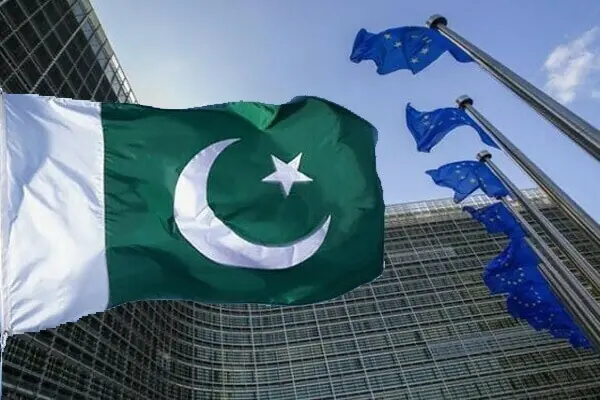KARACHI: Pakistan on Monday apprised a European Union (EU) delegation of measures taken to strengthen governance and human rights protections, reaffirming the country’s resolve to uphold obligations under the Generalised Scheme of Preferences Plus (GSP+) framework.
The development came as a high-level delegation of the European Parliament’s Committee on Development, led by Lukas Mandl (Austria), visited the Ministry of Commerce, Islamabad, for a discussion with Federal Minister for Commerce Jam Kamal Khan.
EU Ambassador to Pakistan H.E. Raimundas Karoblis also accompanied the delegation.
The EU’s GSP+ gives developing countries a special incentive to pursue sustainable development and good governance.
Eligible countries have to implement 27 international conventions on human rights, labour rights, environment, and good governance.
In return, the EU cuts its import duties to zero on more than two thirds of the tariff lines of their exports.
The beneficiary countries include Pakistan, Bolivia, Cape Verde, Kyrgyzstan, Mongolia, Philippines, Sri Lanka, and Uzbekistan.
GSP plus status: EU review puts Pakistan’s duty-free export to the test amid reforms push
Pakistan’s GSP+ status expired in 2023, but the current GSP scheme has been extended for four years until 2027. Pakistan can continue to benefit from it with new requirements to meet.
According to a statement from the Commerce ministry, the Monday’s meeting underscored Pakistan’s continued commitment to strengthening EU–Pakistan relations, particularly under the GSP+ framework, which has played a crucial role in promoting sustainable trade, development cooperation, and human rights in Pakistan.
During the meeting, the minister shared that Pakistan has been elected to the United Nations Human Rights Council for the 2026–2028 term and the National Commission for Human Rights (NCHR) has been granted “A status” accreditation by the Global Alliance of National Human Rights Institutions (GANHRI) – a recognition of Pakistan’s institutional progress.
Jam Kamal Khan further informed that Pakistan has harmonized the legal age of marriage and passed laws such as the Islamabad Child Marriage Restraint Act 2025.
“Other important legislative initiatives include the establishment of the Commission for the Protection of Journalists and Media Professionals, the forthcoming National Commission for Minorities, and the Policy on Interfaith Harmony – reflecting the government’s dedication to freedom, tolerance, and social cohesion,” the ministry statement read.
He discussed the government’s measures to address challenges related to high taxation, energy costs, and interest rates.
The minister also highlighted promising areas for EU investment, particularly in agriculture, food processing, seed development, value-added exports, manufacturing, small and medium enterprises (SMEs), and e-commerce.
Khan invited European companies to partner with Pakistan in technology transfer, sustainable farming, and food-chain innovation.
He also raised two trade concerns with the EU delegation:
The withdrawal of duty concessions on Pakistan’s ethanol exports under the GSP+ scheme, which “has adversely affected rural livelihoods and farming communities”.
The issue of Geographical Indication (GI) registration of Basmati rice, urging the EU to ensure “a fair and impartial decision that recognises Pakistan’s heritage and rightful claim to the globally renowned rice variety”.
The minister stated that both issues are critical for Pakistan’s rural economy and the livelihoods of millions of farmers, especially in the wake of recent floods that impacted the agricultural sector.
He appreciated the EU’s technical engagement and sought enhanced cooperation on emerging EU regulatory compliance frameworks such as the Carbon Border Adjustment Mechanism (CBAM), Corporate Sustainability Due Diligence Directive (CSDDD), and the EU Deforestation Regulation (EUDR).
“Pakistan looks forward to EU technical support and capacity building to strengthen its ability to meet new sustainability and climate standards,” Khan emphasised.
Meanwhile, senior officials from the ministry and the Intellectual Property Organisation (IPO) informed the delegation that Pakistan has joined the Madrid Protocol on Trademarks and the Marrakech Treaty for the Visually Impaired, with further reforms in progress on patents and copyrights. The delegation was briefed that strong IP laws are “a government priority for improving investor confidence and competitiveness”.
“Members of the European Parliament, including Lukas Mandl and Marc Jongen, appreciated Pakistan’s constructive engagement, openness in discussion, and the government’s focus on reforms and human capital development. They acknowledged Pakistan’s potential and reiterated that dialogue, transparency, and partnership would continue to guide the EU–Pakistan relationship,” the statement said.
Islamabad reaches out to Poland for GSP+ support
The delegation also discussed issues of global concern, including peace, education, and economic cooperation.
“Mandl expressed appreciation for Pakistan’s hospitality and shared observations on the importance of strengthening democratic and human rights cooperation globally.”
The minister reiterated, “Pakistan fully owns and advances global agendas on human rights, labour rights, and climate action, aligning with the objectives of the GSP+ framework”.
“Pakistan seeks mutual growth, sustainable partnerships, and shared prosperity with the European Union,” he emphasised.
“The meeting concluded with expressions of appreciation from both sides and a reaffirmation to further strengthen EU–Pakistan bilateral cooperation in trade, investment, and sustainable development.”
The EU delegation also included Robert Biedroń (Poland), Juan Fernando López Aguilar (Spain), and Tomáš Zdechovský (Czechia), along with advisors Christian Meseth, Janetta Cujkova, and Teresa Paula de Figueiredo Mergulhão.
The GSP+ status has enabled robust export growth for Pakistan, especially in the textile sector, and serves as a cornerstone of EU-Pakistan economic relations. The continuation of GSP+ is not only a trade priority, it is crucial for maintaining export competitiveness, creating jobs, and sustaining bilateral trade momentum.


